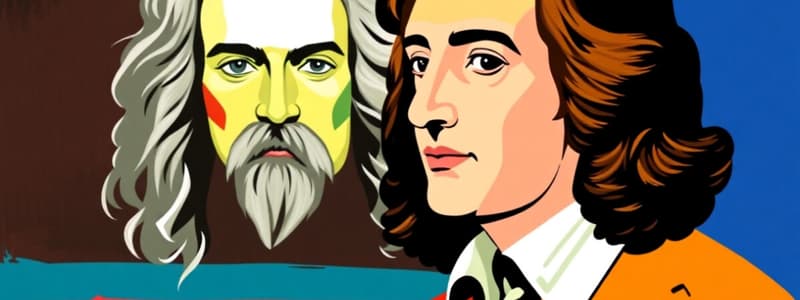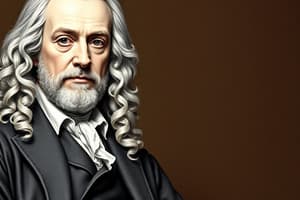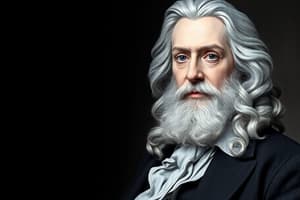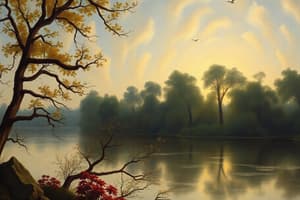Podcast
Questions and Answers
Which right is NOT mentioned as being given by God?
Which right is NOT mentioned as being given by God?
- Life
- Property (correct)
- Liberty
- Pursuit of Happiness
The colonists supported the British government until they decided to alter it.
The colonists supported the British government until they decided to alter it.
False (B)
What actions did Jefferson attribute to the British king that were seen as abuses of power?
What actions did Jefferson attribute to the British king that were seen as abuses of power?
Taxation without consent, interference with trade, denial of trial by jury, deprivation of self-government.
The colonists believed it was their right to alter or abolish a government that becomes __________.
The colonists believed it was their right to alter or abolish a government that becomes __________.
Match the following actions of the British king with their corresponding grievances:
Match the following actions of the British king with their corresponding grievances:
What was a significant reason for the American colonies declaring independence from England?
What was a significant reason for the American colonies declaring independence from England?
The House of Burgesses was established in the 19th century.
The House of Burgesses was established in the 19th century.
What document did the Pilgrims author to govern themselves in the Plymouth Colony?
What document did the Pilgrims author to govern themselves in the Plymouth Colony?
The belief that people should govern themselves is closely related to the desire to limit the power of ______.
The belief that people should govern themselves is closely related to the desire to limit the power of ______.
What type of government did the colonists have prior to the American Revolution?
What type of government did the colonists have prior to the American Revolution?
Match the events/terms with their descriptions:
Match the events/terms with their descriptions:
What was the primary reason that colonists opposed the Stamp Act?
What was the primary reason that colonists opposed the Stamp Act?
By 1776, the thirteen colonies had lived under British rule for less than a century.
By 1776, the thirteen colonies had lived under British rule for less than a century.
What was the attitude of American colonists towards the king prior to the Revolution?
What was the attitude of American colonists towards the king prior to the Revolution?
The Stamp Act was widely accepted by the colonists.
The Stamp Act was widely accepted by the colonists.
What were the Townshend Acts primarily focused on taxing?
What were the Townshend Acts primarily focused on taxing?
The event on March 5, 1770, that resulted in the death of three colonists is known as the _____ Massacre.
The event on March 5, 1770, that resulted in the death of three colonists is known as the _____ Massacre.
Match the following events with their significance:
Match the following events with their significance:
Who was one of the first to die in the Boston Massacre and later became a prominent figure in its portrayal?
Who was one of the first to die in the Boston Massacre and later became a prominent figure in its portrayal?
British troops arrived in Massachusetts as a direct response to the Boston Tea Party.
British troops arrived in Massachusetts as a direct response to the Boston Tea Party.
What action did the Massachusetts legislature take in response to the Townshend Acts?
What action did the Massachusetts legislature take in response to the Townshend Acts?
Which philosopher's ideas were crucial to the American beliefs about government?
Which philosopher's ideas were crucial to the American beliefs about government?
John Locke suggested that natural rights are granted by the government.
John Locke suggested that natural rights are granted by the government.
What are the three natural rights identified by John Locke?
What are the three natural rights identified by John Locke?
The document signed by King John in 1215, which recognized certain rights, is called the __________.
The document signed by King John in 1215, which recognized certain rights, is called the __________.
Match the following terms with their descriptions:
Match the following terms with their descriptions:
What was a significant effect of the Magna Carta over time?
What was a significant effect of the Magna Carta over time?
The natural rights described by John Locke could be revoked by a king.
The natural rights described by John Locke could be revoked by a king.
What is the significance of the clause from the Magna Carta that states, 'No freemen shall be taken...except by the lawful judgment of his peers'?
What is the significance of the clause from the Magna Carta that states, 'No freemen shall be taken...except by the lawful judgment of his peers'?
What event is referred to as the Boston Tea Party?
What event is referred to as the Boston Tea Party?
The Coercive Acts were intended to reward Boston for its loyalty to British rule.
The Coercive Acts were intended to reward Boston for its loyalty to British rule.
Who drafted the Declaration of Independence?
Who drafted the Declaration of Independence?
The _______ Congress was formed as a reaction to the Coercive Acts.
The _______ Congress was formed as a reaction to the Coercive Acts.
Which of the following was a consequence of the Boston Tea Party?
Which of the following was a consequence of the Boston Tea Party?
The Tea Party movement in the 2010s aimed to replicate the actions of the Boston Tea Party.
The Tea Party movement in the 2010s aimed to replicate the actions of the Boston Tea Party.
What did the Declaration of Causes drafted by the Second Continental Congress explain?
What did the Declaration of Causes drafted by the Second Continental Congress explain?
What was the primary reason Parliament removed King James II during the Glorious Revolution?
What was the primary reason Parliament removed King James II during the Glorious Revolution?
The English Bill of Rights was passed after William and Mary were invited to rule England.
The English Bill of Rights was passed after William and Mary were invited to rule England.
What document had a significant influence on the U.S. Constitution and Bill of Rights?
What document had a significant influence on the U.S. Constitution and Bill of Rights?
According to Locke, government exists to protect the rights to _____, liberty, and property.
According to Locke, government exists to protect the rights to _____, liberty, and property.
What concept did Locke introduce regarding the relationship between the government and the people?
What concept did Locke introduce regarding the relationship between the government and the people?
Locke believed that monarchy was a system created by God.
Locke believed that monarchy was a system created by God.
Match the following concepts with their descriptions:
Match the following concepts with their descriptions:
What restriction did Locke place on property acquisition from the commons?
What restriction did Locke place on property acquisition from the commons?
Flashcards
Natural Rights
Natural Rights
God-given rights to life, liberty, and property.
Magna Carta
Magna Carta
A document signed by King John in 1215 that limited the power of the monarch and protected the rights of English citizens.
Due Process
Due Process
A clause in Magna Carta that established the principle of due process, guaranteeing that citizens cannot be punished without a fair trial.
Divine Right
Divine Right
Signup and view all the flashcards
Who is John Locke?
Who is John Locke?
Signup and view all the flashcards
Limited Government
Limited Government
Signup and view all the flashcards
Influence of English Thought
Influence of English Thought
Signup and view all the flashcards
Individual Rights
Individual Rights
Signup and view all the flashcards
Bill of Rights
Bill of Rights
Signup and view all the flashcards
Social Contract
Social Contract
Signup and view all the flashcards
Property Rights
Property Rights
Signup and view all the flashcards
Right to Revolution
Right to Revolution
Signup and view all the flashcards
Liberalism
Liberalism
Signup and view all the flashcards
Glorious Revolution
Glorious Revolution
Signup and view all the flashcards
Self-Government
Self-Government
Signup and view all the flashcards
Representative Government
Representative Government
Signup and view all the flashcards
Abuse of Power
Abuse of Power
Signup and view all the flashcards
Colonial Self-Governance
Colonial Self-Governance
Signup and view all the flashcards
Rights of the Colonists
Rights of the Colonists
Signup and view all the flashcards
The American Revolution's Spark
The American Revolution's Spark
Signup and view all the flashcards
Transition to Independence
Transition to Independence
Signup and view all the flashcards
Consent of the Governed
Consent of the Governed
Signup and view all the flashcards
Declaration of Independence
Declaration of Independence
Signup and view all the flashcards
What was the Stamp Act?
What was the Stamp Act?
Signup and view all the flashcards
What were the Townshend Acts?
What were the Townshend Acts?
Signup and view all the flashcards
What was the Boston Massacre?
What was the Boston Massacre?
Signup and view all the flashcards
What was the concept of 'direct representation'?
What was the concept of 'direct representation'?
Signup and view all the flashcards
What is a boycott?
What is a boycott?
Signup and view all the flashcards
What was the essence of British 'taxation without representation'?
What was the essence of British 'taxation without representation'?
Signup and view all the flashcards
Who were the 'Sons of Liberty'?
Who were the 'Sons of Liberty'?
Signup and view all the flashcards
How did the Boston Massacre impact the colonists' resistance?
How did the Boston Massacre impact the colonists' resistance?
Signup and view all the flashcards
What was the Boston Tea Party?
What was the Boston Tea Party?
Signup and view all the flashcards
What were the Coercive Acts?
What were the Coercive Acts?
Signup and view all the flashcards
What was the First Continental Congress?
What was the First Continental Congress?
Signup and view all the flashcards
What was the Second Continental Congress?
What was the Second Continental Congress?
Signup and view all the flashcards
What was the Declaration of Independence?
What was the Declaration of Independence?
Signup and view all the flashcards
What is the concept of 'consent of the governed'?
What is the concept of 'consent of the governed'?
Signup and view all the flashcards
What were the battles of Lexington and Concord?
What were the battles of Lexington and Concord?
Signup and view all the flashcards
Who was Thomas Jefferson?
Who was Thomas Jefferson?
Signup and view all the flashcards
Study Notes
Political Thought in the American Colonies
-
Colonial beliefs about government were long-standing, heavily influenced by important thinkers.
-
John Locke, a 17th-century English philosopher, was the most influential political thinker regarding the relationship between government and natural rights.
-
Locke's ideas were foundational to modern political thought. His writings formed the basis for many modern political ideas.
-
Locke wasn't the first to suggest people have rights, but the British government had previously acknowledged its duty to protect the lives, liberties, and property of English citizens.
-
Magna Carta (1215) emphasized protections for life, liberty, and property and influenced later documents like the U.S. Constitution. English subjects, including those in North America, viewed Magna Carta as a cornerstone of liberty.
-
Locke argued natural rights originate from God and cannot be taken away by human beings or institutions.
-
Colonial settlers believed in the right to acquire property by investing labor in natural resources.
-
The colonists believed that government should protect acquired property.
-
Locke proposed a social contract where governments are created by the people and must protect rights (life, liberty, and property). If governments fail to uphold their end of the agreement, citizens have the right to withdraw consent and establish new governance.
-
Colonists believed in limiting government power and self-government.
-
The British government allowed for a degree of self-governance, exemplified by elected legislatures like the House of Burgesses and the Mayflower Compact.
-
American political thought was deeply influenced by the belief that people should govern themselves.
-
The idea of elected representation was well-established in Britain, influencing early Colonial governance.
-
The colonists resented direct taxation without representation. Consenting to taxation was viewed as a major part of rights.
-
Colonial protest against taxes that did not have their consent led to resistance; for example, the Boston Tea Party challenged British policies.
-
The Boston Massacre was a pivotal event, heightening colonial resistance to British authority and illustrating the abuse of power by the British.
-
The American Revolution began when colonists believed the king and Parliament had violated their rights.
-
The Declaration of Independence, authored by Thomas Jefferson, outlined the reasons for rebellion, emphasizing natural rights and the right of the people to alter or abolish a government that is destructive of those ends.
Studying That Suits You
Use AI to generate personalized quizzes and flashcards to suit your learning preferences.




